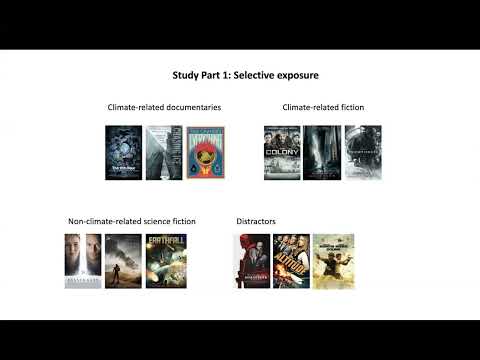 Speaker: Helena Bilandzic @Helena_Bilandzic & Anja Kalch
Speaker: Helena Bilandzic @Helena_Bilandzic & Anja Kalch
 Affiliation: University of Augsburg, Germany
Affiliation: University of Augsburg, Germany
Title: How climate change narratives help to engage audiences: Experimental evidence
Abstract (long version below): Empirical ecocriticism is an emerging field that combines insights from the environmental humanities with methods from environmental communication and the empirical study of literature in order to study the impact of environmental narratives in literature, film, television, video games, and other media on attitudes, emotions, perceptions, and behavior (Małecki, 2019; Schneider-Mayerson, Weik von Mossner, et al., 2020). While still relatively new, the field has already generated significant interest in academia and beyond, with special journal issues and edited collections devoted to it (Schneider-Mayerson et al., 2023), as well as media coverage by the likes of Newsweek or Psychology Today. This interest is mainly due to the exciting output generated by empirical ecocriticism on the potential of stories to move the public on today’s most pressing environmental issues such as animal welfare, species extinction, and climate change (Brereton & Gómez, 2020; Iossifidis & Garforth, 2022; Małecki et al., 2016, 2019; Malecki et al., 2021; Myren-Svelstad, 2023; Sabherwal & Shreedhar, 2022; Schneider-Mayerson, 2018; Schneider-Mayerson, Gustafson, et al., 2020). The symposium focuses on the latter topic, providing new experimental data from studies conducted with Indian, German, and US participants, on the impact of climate narratives, both fictional and factual, on personal norms, emotions, and behavioral intentions.

 Long abstract
Long abstract
The increasing availability of climate change information does not ensure that citizens actually use it and confront themselves with the issue (Stoknes, 2014). “Climate fatigue” (Kerr, 2009) is discussed as an explanation for disengagement with the issue, particularly in relation to emotionally challenging news reports. Moreover, individual differences exist that determine a person’s willingness to inform themselves and engage with the issue of climate change. In this study, we investigate how climate fiction is able to engage people despite tendencies of climate fatigue. We conducted a two-part experiment with a cross-sectional sample (n=304) that first tests the conditions for selecting narratives of climate change (fictional and factual). Second, the experiment investigates the effect of a fictional story dealing with climate change (novel “History of water” by M. Lunde, 2018) on the awareness of consequences, personal norms, and behavioral intentions, and consider narrative engagement (Busselle & Bilandzic, 2009) as a mediating factor. In addition, we test whether the coping style (the way in which people deal with problems, Carver et al., 1989) changes these relationships. Results reveal that narrative engagement is key for any story to be effective and that coping style indeed makes a difference for selective exposure as well as effects.
We discuss the results against the backdrop of narrative persuasion theories and the potential of stories to engage audiences with climate change.
References
Busselle, R. W., & Bilandzic, H. (2009). Measuring narrative engagement. Media Psychology, 12, 321 -347. https://doi.org/10.1080/15213260903287259
Carver, C. S., Scheier, M. F., & Weintraub, J. K. (1989, Feb). Assessing coping strategies - a theoretically based approach. Journal of Personality and Social Psychology, 56(2), 267-283. APA PsycNet
Kerr, R. A. (2009, Nov 13). Amid worrisome signs of warming, ‘climate fatigue’ sets in. Science, 326(5955), 926-928. https://doi.org/10.1126/science.326.5955.926
Stoknes, P. E. (2014). Rethinking climate communications and the “psychological climate paradox”. . Energy Research & Social Science 1, 161–170. https://doi.org/doi:http://dx.doi.org/10.1016/j.erss.2014.03.007

